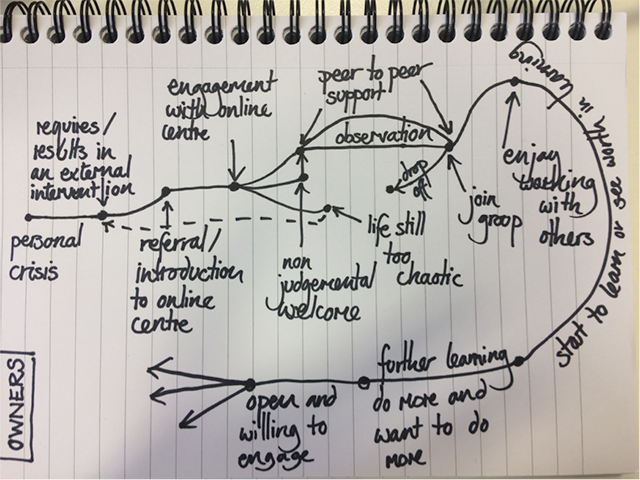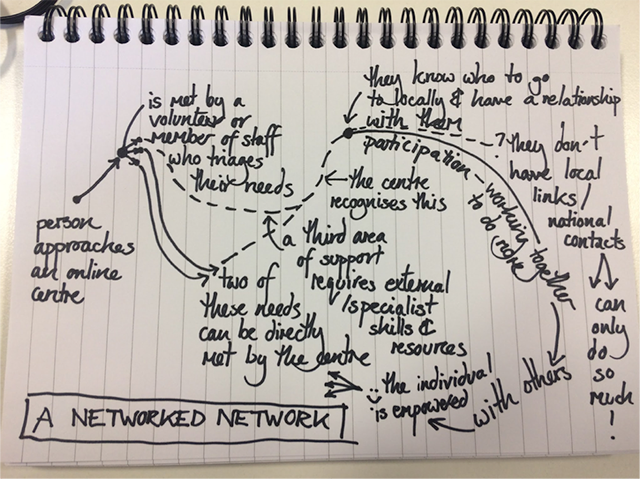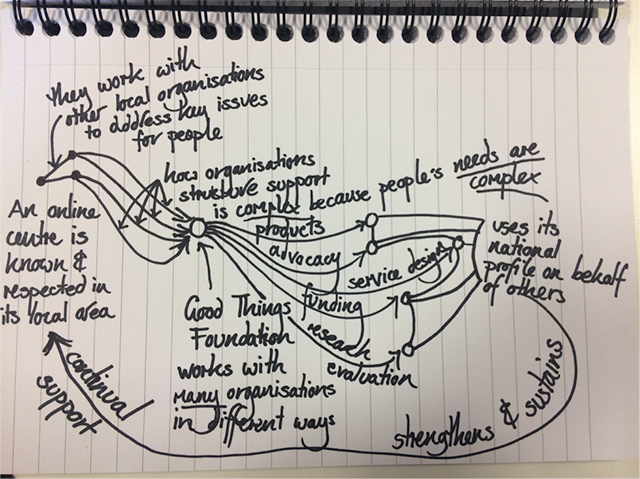Theory of Change: Willingness to Engage
Head of Research Al Mathers looks at how digital inclusion and social change occurs as a result of the network and our existence.
It’s important as an organisation that we, Good Things Foundation, can conceptualise how digital inclusion and social change occurs as a result of the network and our existence. This is about how we can see behaviour changes happening. The Good Things Theory of Change is build upon interactions and interventions that promote an attitudinal shift towards Willingness to engage.
Willingness to engage takes individuals, communities and society from a position where they feel disempowered, isolated and uninspired to a point where a future is possible, a different more included and empowered position is possible, and within reach. This occurs at three levels:
- Level 1: at an individual level or for self (self advocacy)
- Level 2: at a community level or with others (participation)
- Level 3: at a societal level or on behalf of others (volunteering, development of socially conscious responses)
Level 1: at an individual level or for self (self advocacy)
Many people who learn and receive support at Online Centres have been on a considerable journey before they walk through the door of an Online Centre. Often individuals ‘went through a period of crisis – bereavement, homelessness, declining health, and poor mental health – which created a turning point in their life’ (as evidenced in our forthcoming Routes to Inclusion research). Negative interactions with those in positions of authority (education, health, housing, social services and the police) have a damaging legacy, with people feeling powerless to control, or have, their own future. At this point they are often not in a strong enough personal position to seek help, but a suggestion from friends or family or a referral from a professional agency they are in contact with (the job centre, social workers, schools or colleges, housing officers, drug or alcohol support workers, GPs or probation officers) brings them to the Online Centre.

Stepping through the door can be daunting. Past experiences of support and learning often cast hard shadows over how people feel they will be perceived. When you’ve been told you’re no good, you have no future, you can’t learn, why should you trust anyone? But stepping through the door of an Online Centre is different, you’re not judged and you are with people who are like you. They’ve been through similar difficult times and are getting the help they need. This is where peer-to-peer support is critical, as we know from our Reboot UK project. Your peers are not just those people who are also at the Online Centre for support, they are also those knowledgeable volunteers organising the activities and learning, and often the staff who hold the centres together – this is critical. It’s not a professionally obligation that creates behaviour change. It’s a shared, lived understanding and experience.
Someone asking if you’d like a drink, giving you more than your allotted 10 minutes, helping you deal with the practical upsets and headaches (getting from A to B, paying your rent on time, helping organise childcare and doctors or hospital appointment, making sure you can get food on the table that evening) and not pressuring you: these are things that matter. They’re not small things, they’re the necessities. From here, people can relax more and open up. This is the beginning of being willing to engage. Observing and taking part in groups where you’re not on show but you share, you’re not tested but you learn, you’re not alone but a part of something, this is what Online Centres do with such skill. It’s not learning by stealth, it’s what makes Online Centres so effective in changing people’s outlook and why they are able to learn in the first place. The personal changes are obvious as a result. Centres cite (Social Inclusion Focus Group, 2017) how you can see this change: people are more comfortable with who they are, more trusting, they take greater care of themselves, their lives become less chaotic, they are more reliable, happier, more confident and self assured.
Timing in life is critical, and we have to acknowledge, as the Online Centres do, that sometimes people’s lives are at that point still too chaotic to make break certain cycles. However what changes for even these people is the awareness that not all interactions are negative and that there is a place they can go, when they are ready.
Level 2: at a community level or with others (participation)
In order for change to occur in the lives of individuals, Online Centres need to be able to respond to whoever comes through their door, whatever challenges they face. This is not an easy ask. In times of austerity, where funding streams continue to shrink, the divide between those who not only survive but flourish and those who struggle to exist, continues to grow. Online Centres have an open door policy. This means that they are seeing more people whose needs are desperate and complex.

Knowing and being able to negotiate the system, or the systems, in which the people have to operate is crucial. Individuals may have physical and mental health needs, face language barriers, be at risk of losing their home and have no personal support networks to draw upon. They also rely on public services, but often struggle to meet the demands that these place on them. Many centres support individuals to navigate and resolve interlinked and complex problems.
They do this with very little resource, through persistence and personality. However, this places them in a position of vulnerability. Their funding is often precarious and short-term, but they are being expected to absorb more. Even if centres have fantastic staff and volunteers, it is often very difficult for them to sustain themselves as businesses.
But some have found a way to not only meet the range of complex needs that people present with, but to flourish. This is the networked network. A network of Online Centres who work participatively with other centres and wider organisations in their local or regional area. These include centres who have relationships with other Online Centres, health professionals (including CCGs and GPs), job centres, social housing providers, CVS, other third sectors specialists, local businesses and national charities. Accessing funding together they are also able to treat the person as a whole. This means understanding that one area of need in a person’s life will impact another i.e. poor mental health due to housing worries will affect someone’s willingness and ability to engage in learning and apply for work. Being outward looking and participatory also means they demonstrate positive organisational behaviours, they’re keen to test new approaches, to draw learnings from others and to share ideas across a wider platform of activity, often online.
Level 3: at a societal level or on behalf of others (volunteering, development of socially conscious responses)

Good Things Foundation works on the behalf of others, Online Centres and the people they support. We learn from the Online Centres Network where the need is and use our national profile and reach to petition and work alongside a range of partners (including government, corporate partners, academic institutions and charities) to support and drive on the ground delivery and innovation.
Our membership offer to the Online Centre network is free. It’s based on a mutual understanding that certain key elements need to be in place to drive social change. That there is a need for free, accessible and user-led learning resources, such as Learn My Way and English My Way, so that when people are willing to engage the right support is there for them. That the value of peer-to peer or the volunteering movement is recognised, by providing skills and support to grow this through our Digital Champion training. That we co-research and design solutions to social challenges with Online Centres, so approaches are context driven and locally owned, whilst having nationally and internationally transferability. That we’re not satisfied with being good enough, that we want our involvement to sustain positive, societal change and to grow year on year. And that we evidence what works, drawing up from the individual story of someone who is now willing to engage, to the Online Centre who made that possible to the national network that works to change society to become a more equal place.
There is more power in the network working together than centres working in isolation or simply through Good Things Foundation. We think about centres as the social infrastructure of our society. This infrastructure needs to be maintained and developed so that working together we can support large-scale shifts in how we approach problems. Our network can be a platform for social change that centres can use to spread good ideas so that ideas come from the bottom up and not just through Good Things Foundation.
Most theories of change are based on an interaction between inputs and outputs i.e. what need exists, what activities take place to answer that need and what is produced as a result in terms of capabilities, skills, outcomes or actions. This is useful in terms of being able to see a flow through a problem and how an organisation works, but it’s only half the picture. The most important thing that many of our centres do, is seeing a person’s life from a holistic perspective, and the potential for that person to be part of something bigger. That it’s a loop, and everyone can evolve and become the start of someone else’s theory of change.

Al Mathers
Head of Research, Data and Insight
Al’s role is to lead the Good Things Foundation Research Team to be at the cutting edge of digital social inclusion impact measurement, and make sure everything we do is evidence driven.
